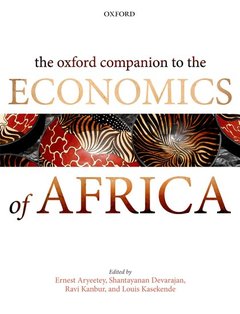Description
The Oxford Companion to the Economics of Africa
Coordinators: Aryeetey Ernest, Devarajan Shantayanan, Kanbur Ravi, Kasekende Louis
Language: English
Subject for The Oxford Companion to the Economics of Africa:
Publication date: 01-2012
686 p. · 19.5x25.3 cm · Hardback
686 p. · 19.5x25.3 cm · Hardback
Description
/li>Contents
/li>Biography
/li>
Africa is a diverse continent. But is there a pattern to the diversity? Are there commonalities across the countries? And what does economics tell us about the diversity and the commonalities? The Oxford Companion to the Economics of Africa is a definitive and comprehensive account of the key issues and topics affecting Africa's ability to grow and develop. It includes 53 thematic and 48 country perspectives by a veritable who's who of more than 100 leading economic analysts of Africa. The contributors include: bright new African researchers based in Africa; renowned academics from the top Universities in Africa, Europe and North America; present and past Chief Economists of the African Development Bank; present and past Chief Economists for Africa of the World Bank; present and past Chief Economists of the World Bank; African Central Bank governors and finance ministers; and four Nobel Laureates in Economics.
Preface. Entries by Subject. Thematic Perspectives. Country Perspectives. Directory of Contributors. Overview. Thematic Perspectives. African Development Prospects. Agriculture. Aid. Conflict and Reconstruction. Employment. Environment. Globalization. Governance and Political Economy. Human and Social Development. Industry, Investment, and infrastructure. Macroeconomics and Finance. Natural Resources. Country Perspectives.
Prior to his appointment as Vice Chancellor Ernest Aryeetey was a Senior Fellow and Director of the Africa Growth Initiative at the Brookings Institution, Washington, D.C. He was earlier Director of the Institute of Statistical, Social and Economic Research (ISSER) of the University of Ghana from 2003-2010. His research focuses on the economics of development and the role of institutions in development, regional integration, economic reforms, financial systems in support of development and small enterprise development. He is well known for his work on informal finance and microfinance in Africa. He has published with leading development journals and publishers. Among his publications are Financial Integration and Development in Sub-Saharan Africa (Routledge 1998) and Economic Reforms in Ghana: the Miracle and the Mirage (James Currey 2000). Since joining the World Bank in 1991, Shantayanan Devarajan has been a Principal Economist and Research Manager for Public Economics in the Development Research Group, and the Chief Economist of the Human Development Network, and of the South Asia Region. He was the director of the World Development Report 2004: Making Services Work for Poor People. Before 1991, he was on the faculty of Harvard University's John F. Kennedy School of Government. The author or co-author of over 100 publications, Mr. Devarajan's research covers public economics, trade policy, natural resources and the environment, and general equilibrium modeling of developing countries. Born in Sri Lanka, Mr. Devarajan received his B.A. in mathematics from Princeton University and his Ph.D. in economics from the University of California, Berkeley. Ravi Kanbur holds an appointment tenured both in the Charles H. Dyson of Applied Economics and Management in the College of Agriculture and Life Sciences, and in the Department of Economics in the College of Arts and Sciences. He has taught at the Universities of Oxford, Cambridge, Essex, Warwick, Princeton and Columbia.
© 2024 LAVOISIER S.A.S.




